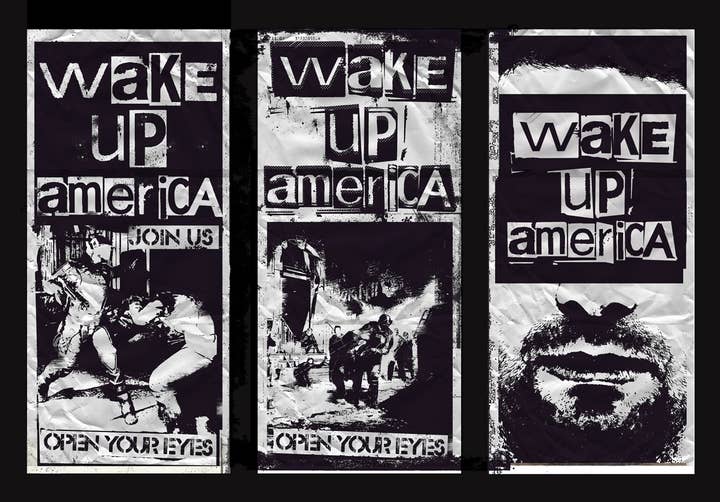Make alternate future America great again
Deep Silver's Will Powers explains how Homefront: The Revolution is getting a boost from the US presidential race
Donald Trump is the presumptive Republican nominee for president of the United States, and Homefront: The Revolution hits shelves next week. These two disparate facts have one particular thing in common: five years ago, they seemed as unlikely as the original Homefront's premise of a successful North Korean invasion of US soil.
In mid-2011, Donald Trump was a cable news side show hounding Barack Obama for proof of his US citizenship, while Homefront developer Kaos studios was being shut down by THQ shortly after the original game's launch. Trump's path to presidential candidate is well-chronicled, but Homefront's was no less winding. Despite Kaos' closure, the beleaguered THQ planned to turn the game into a franchise anyway, and partnered with Crytek to have its Nottingham studio handle development. Then THQ went bankrupt, and Crytek picked up the IP, announcing a partnership with Deep Silver to co-publish the game. Crytek hit financial troubles as well, and sold the IP and development team (which was renamed Dambusters) to Deep Silver.
"One of our taglines is 'America's on its knees,' which plays really well into the current geopolitical landscape of 'Make America Great Again."
That twisting tale will finally get some closure, as Homefront: The Revolution is set for release on Tuesday. While five years was probably a longer development cycle than anybody wanted, Deep Silver senior manager of marketing and communications Will Powers acknowledged to GamesIndustry.biz that the timing of the launch alongside Trump's campaign has actually been a bit fortuitous.
"One of our taglines is 'America's on its knees,' which plays really well into the current geopolitical landscape of 'Make America Great Again,'" Powers said. "The politicians aren't even shying away from it. No one's saying that America is the greatest country in the world. That's the biggest shift I've seen in this presidential election from every election in the past, where everyone touts, 'We are the greatest country.' [Instead], they're saying 'We need to re-establish and reassert ourselves.' So our messaging is actually aligning really nicely with that."
As an example, Powers pointed to fake pamphlets the Deep Silver street team has been handing out at gaming events like PAX East, propaganda-styled fliers with taglines like "Wake up America" and "Open your eyes."

"We've definitely tweaked our messaging to align better, but it's always been the idea of the format, the goal to have this kind of grassroots sort of resonation with what we're saying," Powers said. "Because in the end, whether it's how we're structuring the game, by removing competitive multiplayer and putting in cooperative multiplayer, really everything we're doing about this game from a messaging standpoint to a gameplay standpoint is about coming together. And that should resonate in the messaging as well.
While Deep Silver is happy to receive a boost from current events, Powers said the company isn't trying to weigh in too heavily on them.
"We made very concerted efforts to not be The Interview," he said. "We didn't want to go down that route, because I feel like it cheapens the IP. It's a very cheap shot and we wanted this to be able to stand on its own legs. So what we did when we were looking at creating a narrative and revamping this universe, we definitely took a kind of Watch Dogs approach. We created an alternate future by creating an alternate past... We're not doing a 1-to-1 politically charged comparison of, 'Oh man, because Donald Trump won the election, this is where we're headed.' Which would be hilarious. I'm not condemning that, I think that definitely has its own merit. But what we're doing is a little bit more serious, and less current events politically charged. "
"So when we created Homefront: The Revolution, it was really the only thing we kept from the original Homefront, that it was an occupied America. That's literally the only thing that makes this Homefront..."
In fact, the alternate past Powers mentioned is an alternate not just from reality, but from the original Homefront. Whereas the original had the North Korean government mount a campaign of global conquest, The Revolution considers the country taking a different path to world power based on a few key changes in history. (For example, there's no Steve Jobs in The Revolution's history, replaced by a North Korean prodigy who propels the country to prominence as a consumer tech power before transitioning into military industrial interests.)
"When we looked at Homefront, we looked at something that conceptually was amazing, and fell short on execution," Powers said. "The IP itself, the backstory and the lore, the premise of an occupied America... that's what we really feel resonated, not the actual execution of the game. That three-to-four hour linear corridor shooter experience, that's not what people remember. They remember, 'This was a really cool premise and I wanted to learn more about this game.' So when we created Homefront: The Revolution, it was really the only thing we kept from the original Homefront, that it was an occupied America. That's literally the only thing that makes this Homefront and ties this back to the first game."
As Powers alluded to, even the gameplay in Homefront is considerably different. He described Dambusters' take on the franchise as an open-world first-person shooter with about 30 hours of gameplay in single-player, a narrative tone reminiscent of Half-Life 2, and a focus on guerilla tactics instead of standard military shooter run-and-gun action. So with all that's changed, why keep the Homefront name in the first place?
"We believe in the IP because there's something really special there in the mentality of taking a super strong force like the United States and flipping that reality on its head, creating an occupied territory and occupied country in this alternate near-future," Powers said. "It resonated well after 2011 with THQ, and it's something we feel resonates to this day because nobody really does it. I don't know why. People do it in other media, movies, and television, whether its Hightower, the Watchmen, or something as simple as looking at alternate futures or realities with The Butterfly Effect. Those stories resonate with audiences, and I think we identified it as a company as something that clearly has an established position in the realm of video games, and we had the opportunity to take advantage of that."

